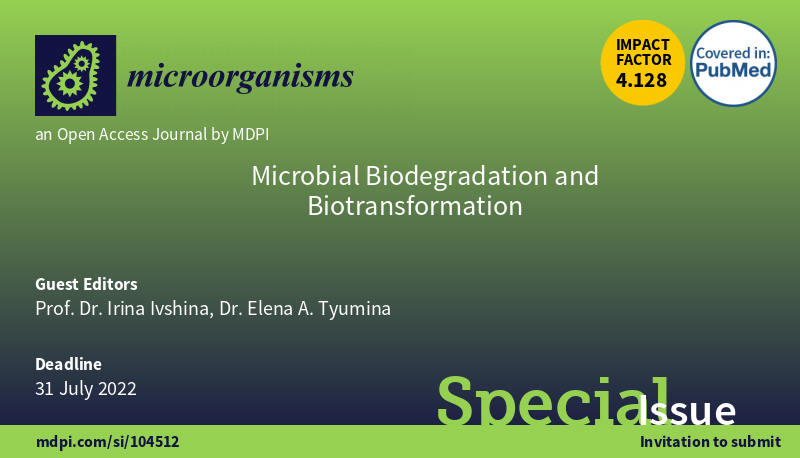PSU Scholars Become Guest Editors of Microorganisms Journal
Which knowledge, gained through university studies, will be required by your future employee? In most fields of natural production – like oil, gas or minerals’ extraction and processing, a company is interested in compliance with the international norms of environmental protection. Environment degradation makes it extremely useful to search for prevention or compensation of anthropogenic pollution. Cleaning the pollutants out of the biosphere remains a constant challenge for humanity.
The scholars from the Department of Microbiology and Immunology, PSU have been invited as editors for the special issue “Microbial Biodegradation and Biotransformation” by of the Microorganisms international scientific journal (ISSN 2076-2607, Web of Science, Scopus, Q2). The issue will present experimental and review articles on modern approaches to microbial destruction and transformation of xenobiotics, as well as innovative technologies for bioremediation of contaminated ecosystems.
Xenobiotics are known as ‘unnatural’ chemical substances found within organisms, artificially introduced or unexpected; they may also be present in much higher concentrations as opposed to the usual ones. Natural compounds can also become xenobiotics if they are taken up by other organism, like the uptake of natural human hormones by fish found downstream of sewage treatment plant outfalls.
In search of rational ways of biodegradation, the efforts of most researchers have been concentrated in applied microbiology.
“Such challenge makes us expand and intensify the study of microorganisms in contaminated environments, the so-called extremotolerant microorganisms or stress-tolerants. These microorganisms play the role of a primary response system to unfavorable or potentially dangerous environmental changes, and initiate their adaptive responses at the earliest stage,”
notes Dr. Irina Ivshina, Academician of the Russian Academy of Sciences, and professor at PSU.
Dr. Irina Ivshina and Dr. Elena Tyumina, researchers from the Department of Microbiology and Immunology, Perm State University, will act as guest editors for the “Microbial Biodegradation and Biotransformation” special issue, section “Environmental Microbiology” by the Microorganisms Journal. Invitations to publish are being sent to leading experts and researchers from Russia, USA, Germany, France, China, Spain, Poland, Great Britain, Australia. The articles will be peer reviewed and published accordingly, the whole process taking about two weeks. Applications are welcomed until 31 July, 2022.

Manuscript Submission Information
Manuscripts should be submitted online at www.mdpi.com by registering and logging, and using its submission form, until the deadline. As already mentioned, all papers will be accepted pert arrival, peer-reviewed, and listed together on the special issue website. Research articles, review articles as well as short communications are invited. For planned papers, a title and short abstract (about 100 words) can be sent to the Editorial Office for announcement on this website.
Submitted manuscripts should not have been published previously, nor be under consideration for publication elsewhere (except conference proceedings papers). All manuscripts are thoroughly refereed through a single-blind peer-review process. A guide for authors and other relevant information for submission of manuscripts is available on the Instructions for Authors page. Microorganisms is an international peer-reviewed open access monthly journal published by MDPI.
Please visit the Instructions for Authors page before submitting a manuscript. The Article Processing Charge (APC) for publication in this open access journal is 2200 CHF (Swiss Francs). Submitted papers should be well formatted and use good English. Authors may use MDPI’s English editing service prior to publication or during author revisions.
Original message from guest editors and editor in chief.
Special Issue “Microbial Biodegradation and Biotransformation”.
